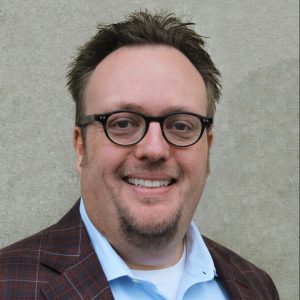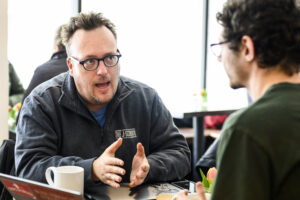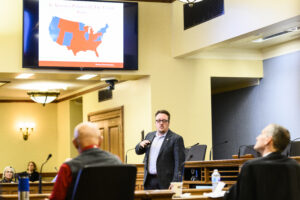Mike Wagner, professor in the School of Journalism and Mass Communication and director of the Center for Communication and Civic Renewal, was named the William T. Evjue Distinguished Chair for the Wisconsin Idea to recognize his outstanding contributions to outreach and service.
 The Evjue Chair, established by the William T. Evjue Foundation, is designed to enhance and further the legacy of the nearly 120-year-old Wisconsin Idea, which holds that the boundaries of the university are boundaries of the state and beyond. The award honors faculty members who have contributed substantially to the outreach mission of UW-Madison and demonstrated their ability to transfer knowledge and research through individual efforts or coordination of multidisciplinary activities, preferably through activities that address an impactful societal problem or opportunity. Wagner is the first SJMC faculty member to receive this honor.
The Evjue Chair, established by the William T. Evjue Foundation, is designed to enhance and further the legacy of the nearly 120-year-old Wisconsin Idea, which holds that the boundaries of the university are boundaries of the state and beyond. The award honors faculty members who have contributed substantially to the outreach mission of UW-Madison and demonstrated their ability to transfer knowledge and research through individual efforts or coordination of multidisciplinary activities, preferably through activities that address an impactful societal problem or opportunity. Wagner is the first SJMC faculty member to receive this honor.
“We are so thrilled to see Mike receive this prestigious honor,” said Kathleen Bartzen Culver, SJMC director and James E. Burgess Chair in Journalism Ethics. “Mike is the living embodiment of the Wisconsin Idea. His excellence is not only widely recognized in his department, field, and by his students, but also because he uniquely shines when it comes to touching the lives of Wisconsinites and people around the world.”
Wagner joined the SJMC faculty in 2012 after earning his Ph.D. in 2006 and serving on the faculties of the University of Delaware and the University of Nebraska. Since coming to UW-Madison, Wagner has been a champion of the Wisconsin Idea, consistently finding ways to share and apply his knowledge with the greater community. Over the years, he has moderated live televised and radio broadcast debates, given more than 350 public talks about his scholarship around the state, nation and globe, taught summer courses to legislative staff at the Wisconsin State Capitol, and become a nationally recognized political communication expert.
 “It’s an incredibly meaningful recognition from the university,” Wagner said. “I’ve dedicated my professional life to trying to serve the Wisconsin Idea. To have people recognize that and provide resources to allow me to help students and my collaborators and I continue that work and share with the people of our state is just exceptionally meaningful to me.”
“It’s an incredibly meaningful recognition from the university,” Wagner said. “I’ve dedicated my professional life to trying to serve the Wisconsin Idea. To have people recognize that and provide resources to allow me to help students and my collaborators and I continue that work and share with the people of our state is just exceptionally meaningful to me.”
Wagner’s research focuses on how individuals’ experiences in the information ecology affect what they believe to be true, what they want from their government in terms of public policies and how they participate civically and politically. This research extends to his work as director of the Center for Communication and Civic Renewal, which aims to understand the broad political communication ecology of Wisconsin and beyond.
“I think that it’s really important for us to try to help contribute to the conversation about what’s possible from self-government. So many of us are so upset, cynical, hopeless, depressed, angry at the things that we see our lawmakers doing, at things that we see in news coverage, and how we treat each other,” Wagner said. “Part of the mission of my work is to help people understand where there is common ground and how we can work together, how we can disagree productively, ethically, and safely, and how we can think about pursuing our work, whether that’s reporting the news, making laws, or living our lives as citizens, in ways that provide people chances to participate, chances to grow, give them opportunities to have basic human rights, and be able to actively pursue what we would think of as the American dream.”
Maier-Bascom Chair and Jack M. McLeod Professor of Communication Research Dhavan Shah applauded Wagner’s commitment to the Wisconsin Idea.

“Mike’s dedication to outreach is a direct extension of his research and teaching. He crisscrosses the state giving public talks, sharing recent scholarship and instructional insights with interested citizens; he appears for media interviews on public radio, public television, and in election coverage, even hosting political debates,” Shah said. “Mike works with teams of graduate and undergraduate students to help them place their research and commentary in public-facing outlets, and he organizes conferences and events that welcome citizens to campus to learn from and share with academics studying media and democracy. He insists on sharing knowledge far beyond the walls of the university, embodying the Wisconsin Idea.”
Another example of Wagner’s efforts is the creation of The Observatory, a website that fact-checks claims made by Wisconsin elected officials and candidates for office. Wagner’s students have conducted more than 80 fact checks of state lawmakers that have been read by more than 37,000 people. These students have gone on to have successful careers at 60 Minutes, 20/20, The Wall Street Journal, the Milwaukee Journal Sentinel, WisPolitics, Wisconsin State Journal and Wisconsin Watch.
A former student for The Observatory, Nina Bertelsen, credits Wagner’s mentorship in helping her grow as a journalist.
“Professor Wagner pushed us to consider topics that were important but not obviously
trendy. And we were required to write community-centered follow-ups to each of the topics that we reported on. In each community follow-up, we translated what leaders discussed behind closed doors, or complicated, nitty-gritty policy, into how it would impact the day-to-day lives of readers,” Bertelsen said. “This took students out of our university-urban bubble. We needed to think about what mattered to teachers’ unions, farmers, truck drivers, small business owners, etc., across the state and reach out to gather their perspective – we needed to share their stories and address their concerns.”
While the Evjue Chair for the Wisconsin Idea honors Wagner, specifically, for his incredible efforts, Wagner credits his students, colleagues and collaborators for the award.
“I’m thrilled to have the chair and the award, but it’s a collaborative effort,” Wagner said. “I couldn’t do anything that I do without the help of the staff in our department or my collaborators or my students.”